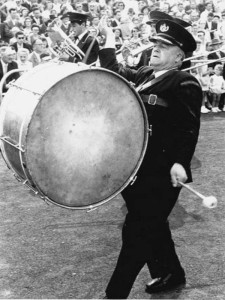Eccles Borough Band History
From local history records the band can trace its birthday to 1886, though it is known that various Congregational Sunday School and military ensembles were in existence in Eccles before this date.
The first mention in despatches of a public brass band for Eccles is to be found in 1874, when a committee of working men set themselves the task of raising funds to set up a band. A band did eventually evolve in 1886, eight years later, known as ‘The Eccles Young Men’s Brass Band’, under the baton of a Mr J Pennington of Weaste. The first public performance was in March of 1887.
The band later changed it’s title to the ‘Eccles Subscription Brass Band’ by the time it had entered it’s first contest in 1888 gaining a 3rd prize at the Leigh Contest. Various contest successes in the late 1880′s and early 1890′s put Eccles on the map, taking 13 prizes from 15 contests by 1891. Once Eccles received its charter as a Borough the band’s current name of Eccles Borough Band was adopted.
In December 1920 the band officially moved into its present rehearsal room in Corporation Road, Eccles, when opened by the Mayor (Alderman Bethel). The bandroom, formerly a shoeing forge had been bought and converted by Mr T H Gardener BSc, JP. (The bandroom was extensively refurbished with the aid of an urban grant in 1981 and remains one of the finest rehearsal facilities within the area).
Shortly after the 1st World War, Eccles were a successful contesting band and several notable contest successes were recorded, which included July Belle Vue placings of 3rd 1919, 1st in 1921 and 1923 and 2nd to Foden’s hat trick wins in 1928. Professional conductors included Messrs Coladney, Owen and Halliwell.
The band’s most famous win was at Belle Vue in September 1930 with J Dow at the helm, where they were awarded 1st in the championship section, beating all the famous bands of the time. They were definitely in the championship category with a £2,000 gold challenge trophy. The whole town celebrated this win with civic recognition, a mayoral speech of congratulation, a concert and a victory dance.
The following year, in September 1931, the band was placed 4th in the Crystal Palace World Championships. The whole town turned out to welcome the band back that Sunday evening, the route to the Town Hall was impassable. The band marched back headed by the Mayor, Deputy Mayor and Mayor Elect. Also in 1931 the band was invited to represent England v Scotland.
The band was invited to broadcast on Radio during their golden jubilee year 1936 and again in January and July of 1937. The band had a busy diary and a solid backing with Mr J L Prestwick (Eccles Protector Lamp and Lighting Company Limited) as President and Mr Gardener as Trustee, had an optimistic future.
During the war years many bandsmen had to leave, but the band did continue to rehearse as it is rumoured the bandmaster insisted his players join the Eccles Fire Brigade and continue as a fire brigade band, with similar players from the Barton Hall Band, under the baton of E Watson.
A revival of Eccles Borough Band under E Bradshaw and G Miller paved the way for better times ahead. The band in the 1950′s contested in the lower sections and from 1957 to 1965 under the baton of Mr E C Buttress they were taken onto the championship arena once more and became one of the busiest brass bands in the area, travelling around the country. The Band travelled abroad for the first time in 1958 and competed in the Kerkrade Wereld Musiek Concours, lodging in homes in the mining village of Spekholzerheide, followed by engagements at Schagen in the north of Holland. In 1960 and 1961 the band were invited to compete in the Edinburgh Contest, which took place in Princess Street Gardens followed by a massed band concert. The band was the first band of any kind to broadcast overseas on the BBC. Three sessions were broadcast to Europe live in one day. (Pre-recorded broadcasts didn’t exist then). A historic moment the band treasures.
The band began a downward trend in the mid 1960′s with the loss of conductor Mr E C Buttress and several key players, the inevitable downward spiral is almost impossible to stop.
In 1969 with no funds, a set of moth eaten adult uniforms and an incomplete set of instruments, a youth band was formed by some very keen local people using the nucleus of several former players. Mr Joe Twigg, the band’s secretary then played a large part in the band’s revival.
By 1971 the band was back on its feet and starting to enter contests in the 4th section under the baton of Mr Wilf Hudson, a former player whose family associations with the band stretched 50 years or more. The youth band title was dropped as players matured and several contest successes were notched up.
Much hard work ensued, gradually building up a band and replacing the oldest instruments, in 1978 the band purchased new uniforms re-establishing maroon and light blue as the band colours. After several short-term conductors, the band in 1984 engaged Martin Obermuller as the musical director.
The band toured Germany in 1985, 1986 and 1987 and undertook several engagements there.
In March 1986, the band purchased 33 new uniforms, in the mess jacket style with gold braiding, and dress trousers. Several contest successes in 1984/1985 season (3 firsts, a second and a third) were enough to gain promotion to the 3rd section locally. In 1985/1986 the band certainly consolidated their status with the 3rd section by narrowly missing promotion to the 2nd section by one point.
Over the last few years our conductors have included Mr Graham Smith, Miss Claire Pownall, Mr Kevin Donaldson and Mr Les Webb. The Band’s present Musical Director is Mrs Mareika Gray.

